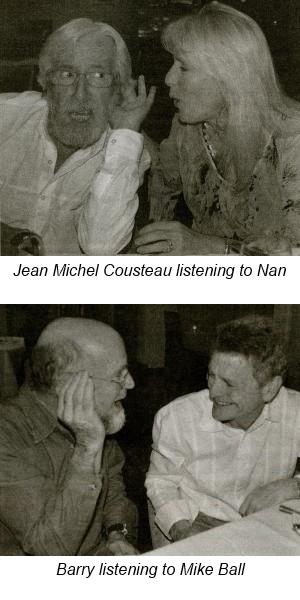
By
Bob HalsteadMost married men understand selective deafness. This is attained by training over many years to automatically tune out sentences with the words “washing up”, “garbage”, “shopping” and so on, and tune in to sentences with words such as “dinner”, “wine”, “sex” etc. Long serving devotees can become quite expert, tuning in to “Dinner is ready” but out to “help with dinner” or “go out to dinner” or ”clean up after dinner”.
It is important that women understand that this is actual, real deafness developed as a kind of defence system that enables men to survive marriage.
I am reporting on this since male divers have an additional problem to contend with. In solidarity with Global Warming believers I will check on the facts later but, at the moment, I will just say what I feel. My feelings are that men seem to suffer from this affliction rather than women and the problem is that male divers develop a high frequency loss, due to diving damaging their ears, which makes conversation around the dinner table difficult if not impossible. I used to sit around thinking of witty replies to conversation, now I just wonder if someone said what I think they did.
This problem advances with age, number of dives (we are talking in thousands here), and whether the diver has done much free-diving – or only used scuba.
Free divers are notoriously prone to ear damage probably because it is harder to clear ears when head down, and, because they are breath-holding, have not got time to hang around if one of their ears is slow to clear. Free divers, but also some scuba divers, may damage their inner ears quite seriously if they fail to clear regularly and easily, and end up with Tinnitus. This is a persistent “ringing” sound in the ears even though the world around is actually silent.
I developed Tinnitus, high frequency loss and selective deafness several years ago at just the time I decided to make a serious attempt at becoming a musician and decided to practice my saxophone rather than mow the lawn (“Sorry dear, what were you saying earlier?”). The neighbours can’t tell the difference and fortunately I can still tell if I am in tune, or, especially, not in tune. Also fortunately, I cannot detect the metronome click while I am playing so can avoid those painful hours practicing with the damn thing (they never keep strict time).
One of the great ironies is that though my ears may be shot, my “hearing” is better than ever in that my appreciation of fine music is growing, while halfwits with perfect ears listen to loud pop music. Ha! Not for long – loud music is more damaging to the ears than diving.
It was a thrill in November 2006 at the fabulous “Ocean Odyssey” in Sydney to meet up again with some of my old friends in the diving world. I had been looking forward to it all year – so many stories to tell. So it was disappointing when I sat down for lunch with Ron and Valerie Taylor, Jean Michel and Nan Cousteau, Barry Andrewartha and Belinda Barnes and Phil and Mary Nuytten. There was just a jumble of noise! Unless I leant forward and cupped my ear I could not understand a thing they were saying.
Then I made a startling observation – all the men were doing the same thing! It was a noisy restaurant with tiled floors and no drapes and none of us could have any conversation except with our immediate neighbours. Fortunately we all realised the problem and got out of there as quickly as we could to a quieter lounge in the hotel where conversation was possible.
That evening at dinner I was able to collect some evidence. Barry Andrewartha caught me talking with Vilia Lawrence of the PNG Diver’s Association, so I grabbed his camera and caught Mike Ball talking to Barry, Cherie Deacon talking to Kevin Deacon of Dive 2000 Sydney, and Nan talking to Jean Michel Cousteau.
Do not think we are complaining – none of us would swap perfect ears for the lifetimes of diving adventures we have all experienced. Perhaps however, with more care, our ears would be better now. If you are young and starting your diving career be aware that your ears may not function as well as a Chartered Accountant’s later in life, and do make sure you are always clearing your ears easily and often, and drying them after a day’s diving to avoid infections. On the other hand you can accelerate the development of the problems by both diving and subsequently listening to lots of loud pop music.
That will ruin your ears, and your hearing.
February 2007
http://www.halsteaddiving.com/adult-section-stories/deep-thoughts/speak-up/